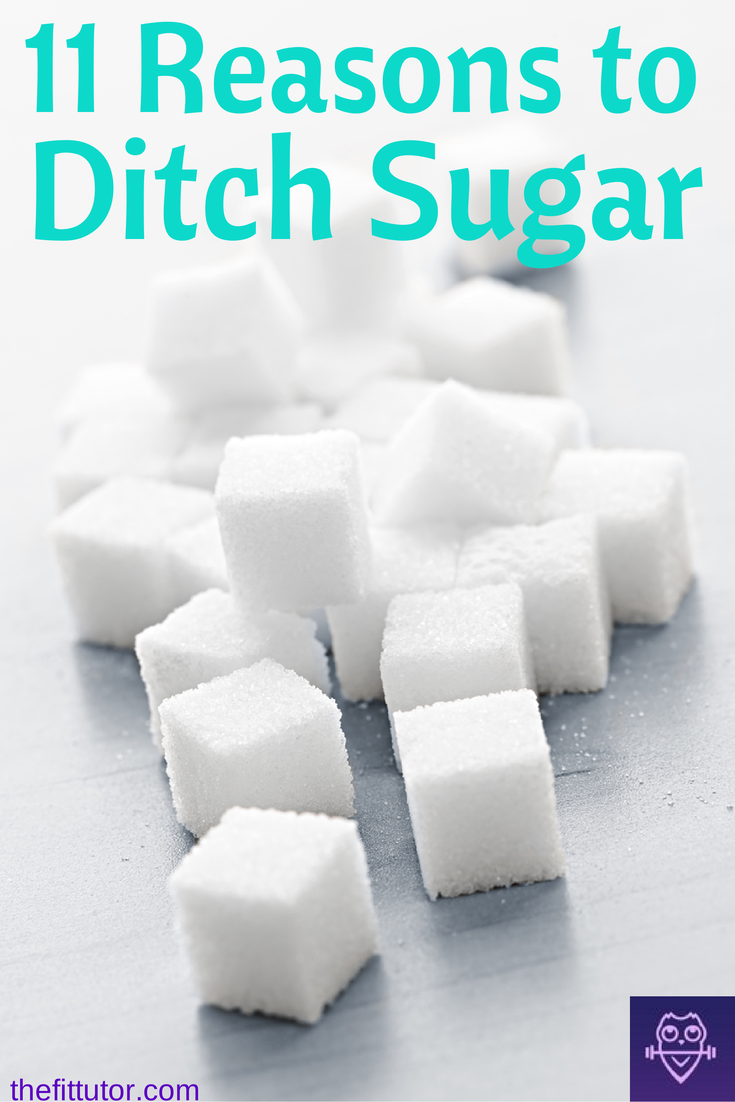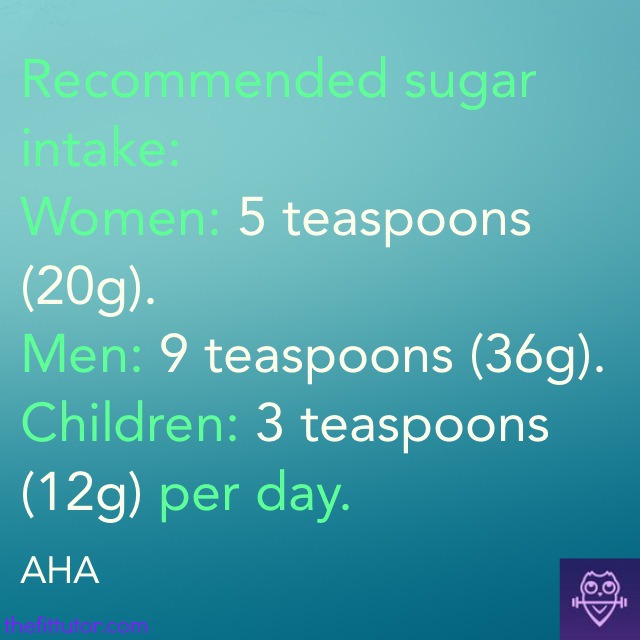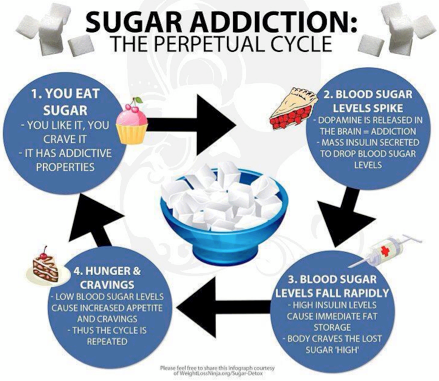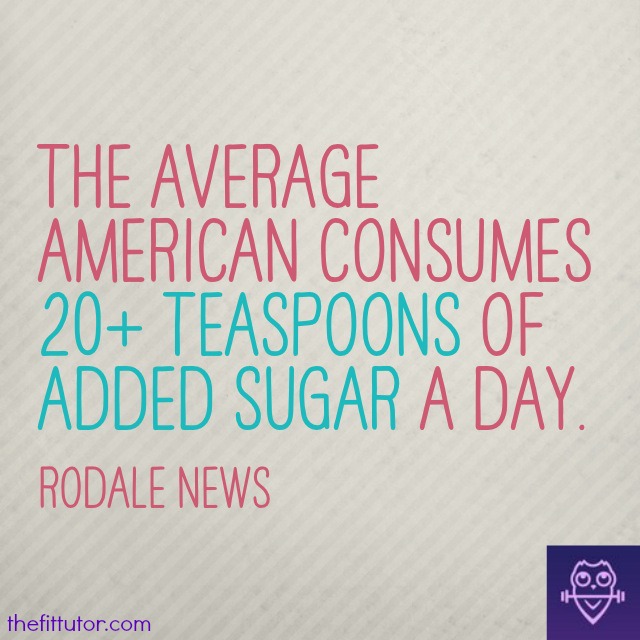Why you should ditch sugar

One of the biggest things I’ve been preaching lately to friends and family is ditching sugar. I see people’s eyes glaze over at the thought of giving up soda, desserts, sugar in their coffee, and know they are instantly discounting everything I say. Most immediately decide it’s impossible to give up or a vice that’s worth keeping, and decide it’s OK to ignore the warnings. I’m here to tell you why it’s 110% worth the price you temporarily pay to cut down your sugar consumption!
Sugar is a drug, and most Americans are addicted to it. It’s a socially acceptable addiction, like caffeine, so people don’t see the harm in indulging. Sugar naturally alters your brain chemistry, and creates both tolerance and withdrawal symptoms just like other drugs. Your brain produces its own feel-good neurotransmitters like dopamine, opioids, and serotonin. The more sugar you consume, the less your brain naturally produces these chemicals.
People associate sugar withdrawals with anger, depression, migraines, low energy, even flu-like symptoms, and of course an overall decrease for tolerating stupidity. Unfortunately sugar has no benefits- you cannot rationalize your sugar addiction by saying that you are getting essential nutrients or calories for energy. The calories that come from sugar have literally NO positive benefit.
In fact, they come with plenty of negative side effects and are connected with several deadly diseases. Here are a few reasons to put forth that effort to kick your sugar habit to the curb:
11 Reasons to Ditch Sugar
1. Sugar is linked to Diabetes
We all can mentally link sugar intake and type II diabetes, but some researchers are suggesting a type III diabetes now as well. It’s considered diabetes of the brain and is linked with Alzheimer’s disease. They suggest that insulin resistance is a key part of Alzheimer’s progression. Just remember that correlation does not equal causation, but it’s another reason to cut your ties with sugar.
Don’t overlook your risk for type II diabetes, either. If you’re overweight, changing your diet and reducing your sugar intake can significantly improve your health. With the rates of sugar consumption skyrocketing compared to just a few decades ago, even “skinny” people or people who appear to be healthy can also be at risk or be pre-diabetic.

2. Sugar affects your mental health
Increased sugar intake is linked with anxiety, depression, hyperactivity, attention and memory problems, not to mention you turn into a crazy person when you don’t get your fix. As mentioned earlier, your brain gets used to a certain amount of sugar, which affects your neurotransmitters, so it decreases its natural production of them. This is why you feel such excruciating side effects without it and intense cravings to get it. Statistics show that those who consume more sugar are 40% more likely to experience depression because your brain releases lower levels of dopamine.

3. Sugar increases your risk for Heart Disease
Although not as well-publicized as breast cancer, heart disease still looms as the #1 killer of women. And your habits play a large role in prevention. High sugar intake is associated with excess insulin, which leads to tense artery walls. This increases your blood pressure, as well as your risk of a heart attack and stroke.
There’s also a strong connection between sugar and cholesterol. A study showed when overweight people consumed large amounts of sugar, they saw a surge in bad cholesterol and a drop in good cholesterol. Too much bad cholesterol is also linked with heart disease and stroke.
4. Sugar “feeds” Cancer
Research has shown that refined sugar feeds malignant cells, so in other words it encourages cancer to grow. [Keep in mind, however, this doesn’t apply to fruit].
Research has also shown that premenopausal women who consume three sugary drinks a week (yes, a week) saw an increase in the density of their breast tissue, which is linked with an increase in breast cancer.
5. Sugar encourages aging
Sugar ages you. I look at how much money I spend on Arbonne and I get physically angry at myself for every donut I’ve ever eaten! ;) Sugar attaches to proteins in your body to create new molecules, called advanced glycation end products (AGEs). These AGEs attack protein fibers in collagen and elastin, which make your skin firm and smooth. A diet high in sugar is linked with wrinkly and saggy skin (sad trombone).
6. Sugar makes you fat
Duh. But let me elaborate. We already established it adds no nutrients with its calories, so the fact that it makes you gain weight should be a no-brainer. It does this in several ways, though, and it encourages your body to store fat in some scary places.
A diet high in sugar affects your body’s ability to know when it’s full. It interrupts your body’s ability to put off and your brain’s ability to interpret signals from the hormone leptin. Leptin tells your body to stop eating. If this isn’t functioning correctly we can overeat and still not feel full.
A diet high in sugar encourages your body to store fat in hard to burn off places, like your butt, thighs, and stomach. Worst of all, it can overwhelm your liver, which will trigger it to store fat in some of your organs. Non-alcohol Fatty Liver Disease rates have skyrocketed, although researchers are conflicted on who the culprit really is (sugar vs. high caloric diets). As I’m studying to get my nutrition certification I’ve realized what a crazy-awesome powerhouse the liver is. Believe me, friends, you want yours in tip-top shape!

7. Sugar is Genetically Modified
Over half of the United States’ sugar production is made from Genetically Modified sugar beets. GMO’s have not been sufficiently tested, especially for long-term use. This specific GM seed originally had its approval revoked. Since Monsanto had quickly dominated the market, not clearing this GM seed could have produced a significant sugar shortage, so the government went ahead with the OK. So basically it was declared unsafe/untested, but later they decided “nahhh…. who cares.” (That’s my official summary).
To avoid GMO sugar, look for the Certified Organic label, 100% Pure Sugar Cane, Sucanat, Turbinado Sugar, Organic Coconut Palm Sugar (my fave to bake with), Blackstrap Molasses, Raw Honey, or Pure Maple Syrup— what else would you add to this list?
8. Sugar is harvested by slaves
Yep. Do you really need another reason to kick the habit? At least switch over to an Ethically Sourced sugar option (look for the Fair Trade label). The Dominican Republic, Latin America, and even Florida have recently been in the news over “Modern Day Slavery.” Use less sugar, and pay a little higher to boycott these horrific practices.
9-11. Other weird side effects
Arthritis: High sugar diets pump inflammatory cytokines into your bloodstream, which can aggravate arthritis. The AGEs previously mentioned lead to inflammation, so sugar is considered an arthritis triggering food.
Your grill: Sugar doesn’t cause cavities and tooth decay directly, but it does trigger bacteria in your mouth to release acid, which eats away at your teeth. This happens anytime you eat carbs, so brush your teeth quickly after a meal and avoid drinking anything with sugar.
Your sex drive: All those episodes of HIMYM where Barney drinks several Red Bulls before another conquest were so deceiving! Excess sugar can impair blood flow to your whoosie-whats-its and can increase the risk of erectile dysfunction in men and sexual arousal disorder in women.
So what now?
Well, since you’re all hopped up on sugar, which is affecting your attention span, we’ll have to cover this in our next post. Next week, stay tuned for tips, strategies, and help with cutting down on sugar. My hubs and I are going through a refined sugar fast for a month (from July 7-Aug 7). I’ll share my journey, what’s worked for us, and some details about the reality of withdrawals :)
If you’re psyched to get started, then start NOW! If you’re not so sure, here are a few things you can do until the next post:
- Identify what your main sources of sugar are
- Keep track of your cravings- when, for what foods, how hydrated you are, etc
- Read labels- what are you using that has a crazy, sneaky amount of sugar? By reading labels, you can still eat that particular thing but find a different brand that has better ingredients! Here’s a helpful list of foods that are a sneaky source of sugar and recommended brands. I don’t approve of everything on this list, but overall it’s a great start: Prevention Magazine.
- Mentally psych yourself up. Just do it. Seriously. It will be worth it in the long run!
- Exercise helps your body to deal with the food you put in it in a healthier, more efficient way. Get started with The Fit Tutor’s workouts today. Learn the fun and empowerment of strength training with a personal trainer, all in the comfort of your own home!

The Best of Luck!
Allison
Check out our other Detox posts:
Sources and helpful articles:
- Prevention Magazine- 57 Names of Sugar
- Women’s Health: Sugar is Killing us
- NPR: Why Sugar Makes us feel so good
- The Food Babe: Ditch Refined Sugar
- Prevention Magazine: 11 Weird Things Sugar is Doing to your Body
- Rodale News: Sugar Addiction
- ABC News: The Effect of Soda on Your Body
- Medical News Today: How Much Sugar is in our Food? (A breakdown of common foods by teaspoon of sugar)
- Science Daily: Specific Sugar Molecules Cause Cancer Growth
- Weightlossforall.com: Glycemic Index of Fruits and Vegetables **You still want to eat fruit, just try to eat more of the ones with lower GI and less of the ones with higher GI.
Also check out the links within the article!
A note on artificial sweeteners and sugar alternatives:
This blog is about sugar, and addressing the issue of alternatives is too much for this post! I will tell you that I do NOT approve of artificial sweeteners, and the only alternative I would consider would be Stevia, in its pure form (read your labels!). If you’re detoxing, you want to get rid of chemicals, not eat things made in a lab. I don’t believe they’ve been researched enough. Here are a few articles if you are interested in the subject!
- My Whole Food Life: A Word About Sweeteners
- The Food Babe: Is Stevia Safe?
- Food Renegade: Agave Nectar: Good or Bad?
- The Daily Sheeple: How to Source Non-GMO Sugar
- Non GMO Project: List of Sugars w/o GMOs
- Mayo Clinic- Artificial Sweeteners and other sugar substitutes
- Dr. Mercola- Artificial Sweeteners- More Dangerous than you Imagined
- Harvard Health: Artificial Sweeteners: Sugar-free but at what Cost?
- Scientific American: Articifical Sweeteners Confound the Brain; May Lead to Diet Disaster
*Disclaimer: I’m not a nutritionist yet, so this is all based on research and is in line with what the AHA and Food Pyramid present as healthy. See your doctor before you change your diet!


I have 23grams just in my morning grape juice, but it says sugars from fruits. Is that kind of sugar better than cane sugar?
Well that depends- does it say it on the label on the front or the actual ingredients list? If sugar is listed as an ingredient, then it’s sugar from fruit PLUS added sugar…. in theory eating fruits is better than cane sugar because you are also consuming fruits with vitamins, fiber, etc that slow down sugar’s entry to your body! Check the label and let me know :)
In the ingredients it says natural fruit sugars. On the front it says no sugar added. And I was wrong, it says 36 grams of sugars. Ingreients are grape juice from concentrate, filtered water, citric acid and ascorbic acid
So 36g of sugar is 9 teaspoons of sugar! It might be good to cut it with water, or find a different brand. Here’s a good article about choosing juice- http://foodbabe.com/2013/11/10/juice-labels/ :)
keep it up..